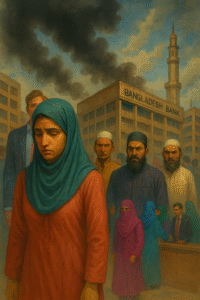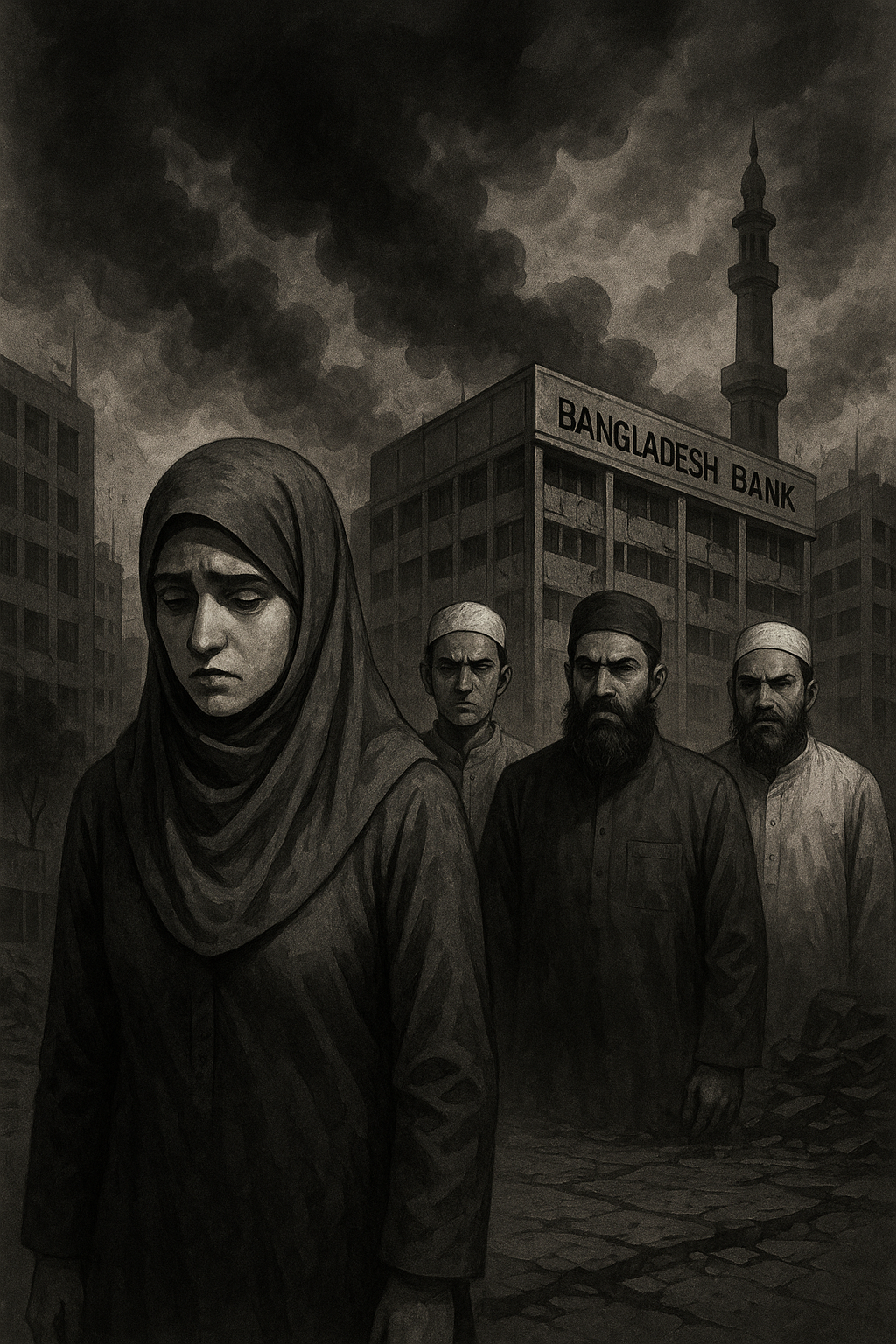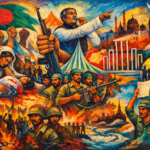In an alarming move, the Bangladesh Bank (BB)—the country’s central financial authority—has issued a draconian dress code that reeks of misogyny, religious authoritarianism, and Taliban-style moral policing. According to verified reports, women employees are now forbidden from wearing leggings, short trousers, half-sleeve blouses, sarees without a head covering, open sandals, or modern shoes. Men are also expected to adhere to a rigidly conservative dress code reminiscent of Wahhabi teachings, with commands to grow beards and adopt ‘modest’ attire.
This grotesque intrusion into personal liberties by a financial institution—not a religious body—is not only absurd but alarming. It is also unconstitutional and a direct violation of Articles 27 and 28 of the Bangladesh Constitution, which guarantee equal rights for women and freedom from religious imposition. So the question arises: Where is Bangladesh heading?
A Bangladesh Unrecognisable to Its Founders
The spirit of the 1971 Liberation War was founded upon secularism, democracy, and freedom from religious extremism. The vision was clear: a nation where Bengali identity superseded narrow religious dogma. The 1972 Constitution enshrined secularism as one of its fundamental pillars.
But in today’s Bangladesh—under a so-called interim government allegedly propped up by a foreign-funded clique, including religious political brokers and NGO-fed Islamists—we see an Orwellian regression to the medieval era. This BB dress code is not an isolated event; it is a dangerous symptom of a nation sliding down the slope of radicalisation under the watch of a regime headed by a man whose own lifestyle, marital history, and elite Western connections make this Islamist pandering not only hypocritical but intellectually dishonest.
The interim government’s silence on this issue is deafening. The head of this regime, known to have married a foreign Eastern European woman and whose own inner circle previously flaunted modern, Western sensibilities, now presides over a country slowly being cloaked in the ideology of Hizb-ut-Tahrir, Tablighi Jamaat, and imported Salafism. This is not governance—it’s betrayal.
From Madrasas to Ministries: The Creeping Islamisation
This is not an isolated incident. In recent years, the Islamisation of Bangladesh has accelerated on multiple fronts:
-
School Curricula Islamised: Secular literature and history have been replaced with madrasa-style content. Important figures of Bengali nationalism and literature have been purged from textbooks to appease the Islamist fringe.
-
Friday Sermons Regulated: The Ministry of Religious Affairs has mandated uniform khutbas (sermons) prepared by the state, reinforcing ultra-conservative narratives and attacking secularism subtly.
-
Suppression of Hindu and Buddhist Celebrations: Puja celebrations have increasingly faced restrictions, with radical groups emboldened to harass minorities under the pretext of “maintaining Islamic purity.”
-
Attacks on LGBTQ+ and Women’s Rights: Writers and bloggers have been hacked to death, queer voices silenced, and women’s rights activists branded as anti-Islamic “foreign agents.” The recent BB dress code is just the tip of this rising iceberg of moral totalitarianism.
-
Islamisation of Bureaucracy: Reports from within the civil service suggest a rising trend of clerical favoritism, veiled religious proselytising in training academies, and the promotion of those who align with Wahhabi-Salafi views.
-
Judiciary Bending to Religious Sentiment: Several rulings have increasingly deferred to religious sensibilities, compromising the notion of a secular legal system.
The signs are no longer subtle. They are written on the walls of every ministry, whispered in every mosque, and now shouted from the circulars of Bangladesh Bank.
Central Bank or Central Shariah Bureau?
Let’s ask a blunt question: since when did the Bangladesh Bank become a Shariah Enforcement Authority?
This institution is supposed to be the bulwark of fiscal prudence, economic strategy, and monetary stability. Instead, it now wants to police women’s clothing and dictate religious modesty codes. This was not decided through any legal amendment, parliamentary bill, or public referendum. It was imposed unilaterally—almost stealthily—by bureaucrats indoctrinated into the Islamist worldview.
It must be understood: when a central bank begins legislating morality, it is a symptom of a failing state. It shows that the boundary between religious dogma and state governance has collapsed.
The radical ideology of Hizb-ut-Tahrir—an outfit banned in many countries for its extremist views and advocacy of a global Islamic caliphate—has long sought to infiltrate state institutions. If one needed proof of their partial success, the BB circular serves as a case study.
The Hypocrisy of the Interim Regime
And yet, the man at the helm—the interim government head—who once shared family life with a European woman and attended soirées with global diplomats, now presides over the erosion of women’s rights and personal liberty. The contrast is as stark as it is grotesque. It signals not just hypocrisy but a calculated political realignment towards appeasing radical Islamists who were once relegated to the fringes.
Is this the price the country must pay for temporary political expediency? Was the trade-off for power the soul of the nation?

International Silence and the Danger of Normalisation
What’s worse, international watchdogs and Western governments—ever eager to comment on developing nations—have largely remained silent on this dress code diktat. Where are the feminists? Where are the human rights activists? Where is the UN?
Silence emboldens tyrants. Normalising such diktats paves the way for further intrusions—first the dress, then the thoughts, and soon the entire lives of citizens. Bangladesh must resist becoming another cautionary tale of how quickly a modernising, democratic country can descend into a medieval theocracy when civil society stays silent and the world looks away.
Conclusion: A Time to Resist
If there was ever a moment for Bangladesh’s civil society, youth, feminists, progressive Muslims, and secular voices to speak up, it is now.
The issue is not just a dress code. It is about the ideological future of the Republic. It is about whether Bangladesh will remain true to its founding values of secularism, equality, and liberty—or whether it will become yet another radical hinterland, where the state decides who gets to wear what, believe what, and speak what.
The secular mosaic of Bangladesh is under assault. This is not alarmism—it is a clarion call. Either the nation wakes up, or wakes up one day to find itself unrecognisable, buried under a veil it never chose to wear.






